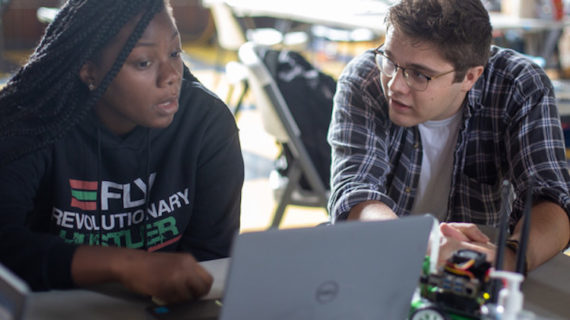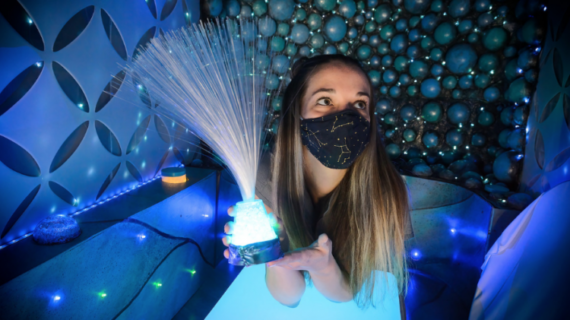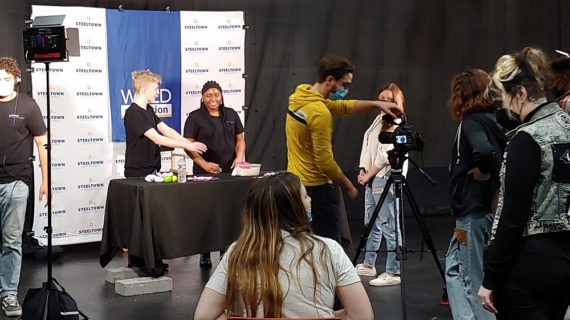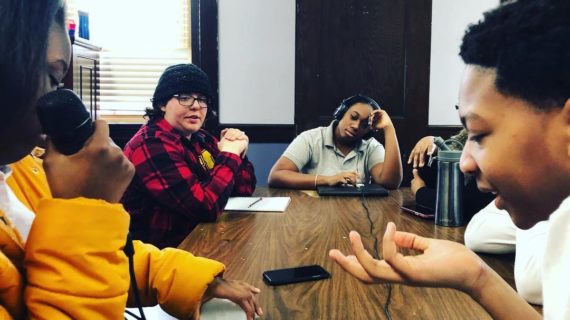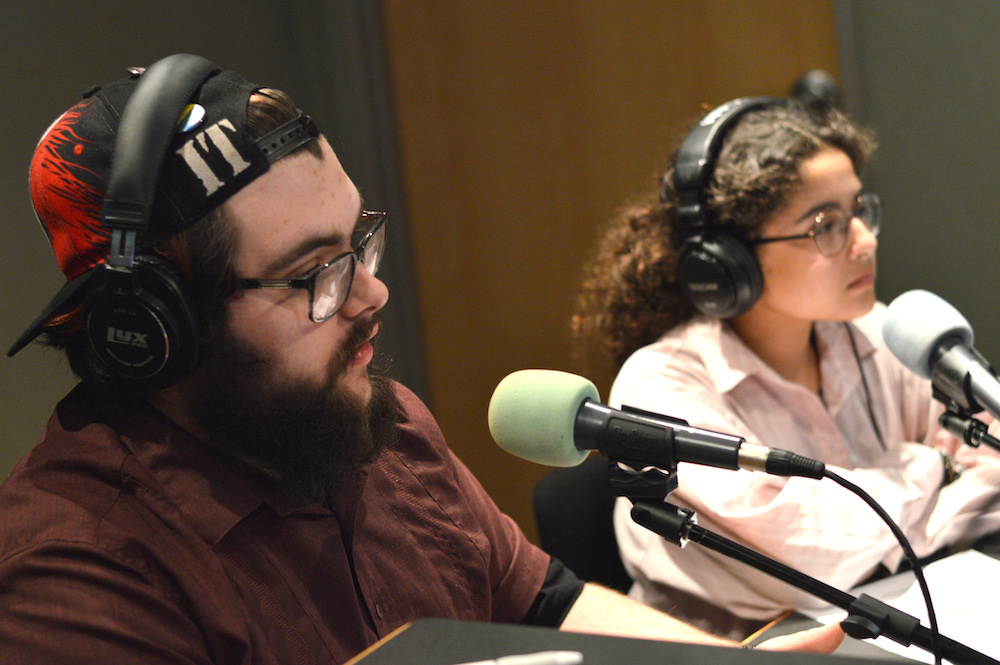
With help from KnowledgeWorks and SLB Radio, local teens take over the Remaking Tomorrow podcast
On the Remaking Tomorrow podcast, educators and community leaders have weekly conversations about the future of learning. From equity and ed tech to the frontiers of personalized learning, social-emotional learning and innovative school design, these adults explore what the future may hold as communities pursue equitable, impactful education for all kids.
This month, those same subjects are being explored on new episodes of Remaking Tomorrow. But a team of high school students has taken over the microphone to interview their peers about the learning-related issues that matter to them most.
Beginning on May 5, new weekly teen-produced episodes will air through June 9.
Folks from Remake Learning, SLB Radio and KnowledgeWorks offered technical assistance and research support, but the students are leading the process by choosing interview topics and conducting interviews themselves. A similar six-episode “takeover” of the podcast happened last August, and again this year the focus is on making space for youth voices while also teaching these students how to use podcasting to get heard.
The student hosts work in pairs, and each pair will helm two episodes of Remaking Tomorrow. In the process, they get more comfortable with the experience of hosting and interviewing.
“The reason we have them repeat it is so you get better. Because the first time, you still have never worked with your partner before. And once you do it the first time, we’d like to give you a chance to do it again, so there’s some growth there as well,” says Larry Berger, executive director at SLB Radio.
The students get creative freedom within a workflow that’s been developed over time by the folks at SLB.
“It’s all about having a good process,” Berger says. “If you have a good process, you can be confident that the outcome is going to be good. … We teach them a way to do it. And if we follow all those steps, we don’t want to say it’s foolproof, but it’s very likely we’ll get to the point that we want to get to.”
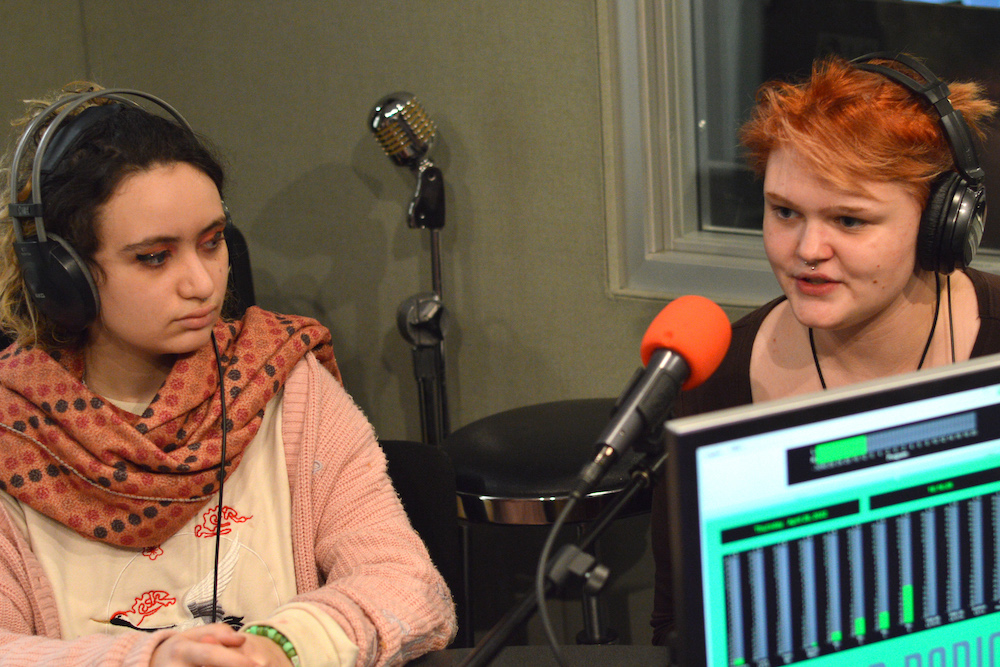
Because these podcast episodes explore what personalized learning could look like and how learning in America could become truly equitable, the KnowledgeWorks team spent time talking with these students about those issues.
Making space for students’ voices and encouraging them to help build tomorrow’s systems is incredibly important, says Jason Swanson, director of strategic foresight at KnowledgeWorks.
“It’s one thing for us as adults, who have context for how the system could change because we’ve been through it, to sit on the outside of it to say ‘Personalization could look this way, this way or this way,'” Swanson says. But “if we were to ask young people to dive deeply into this idea of personalization, how do they define it? How do they hear this term? … And from a young person’s perspective, how do they think about equity? What is their frame and orientation towards this? And if we’re thinking broadly about the future, what does it mean for young people to really describe it as an equitable future of learning?”
Projects like this teen podcast takeover, Swanson says, remind us that “if we’re talking about youth futures, we need to center youth — and particularly youth from impacted populations — in this conversation. It’s their viewpoint that we have to take into account and really hold up. Because again, as adults, we’re looking at this from a radically different perspective.”
The students working on Remaking Tomorrow embraced this chance to share their perspectives. You can hear their words right here on episodes airing now through June 9.
Here are a few excerpts:
“I feel like, growing up, I was really stifled in the way that everything I learned was so conservative and came from a really euro-centric perspective. So, I feel like it would be beneficial to me and the way I perceived others growing up if I learned about other marginalized perspectives early on.” – Aura Chuck-Hernandez, Grade 11, Fox Chapel Area High School
“I switched from two different schools due to some family issues and they were not very accommodating in dealing with kids who had been through traumatic experiences and who were trying to learn how to be people, let alone having to learn and grow as an individual. I got bulldozed by the system and lost within it.” – Alex Scott, Grade 12, Westinghouse Arts Academy
“Ultimately, we’re still going to have problems. These issues can’t just be entirely purged to make a utopia because something will always be wrong, but you can always use your voice; come together with other people of marginalized backgrounds to uplift and help each other.” – Roma Latimore-Dallas, Grade 12, Westinghouse Arts Academy
